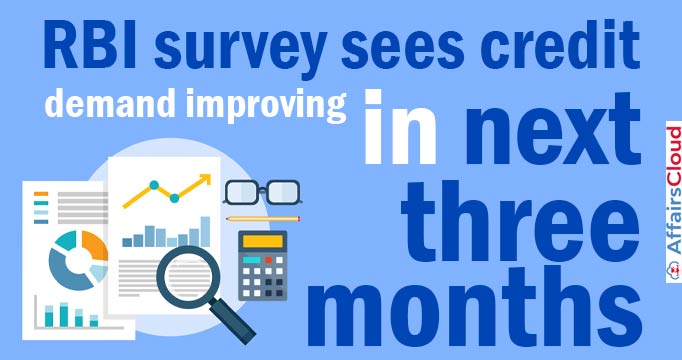
According to the Reserve Bank of India’s (RBI) 22nd round of Systemic Risk Survey (SRS), which was conducted in May 2022demand for credit, is expected to see marginal to considerable improvement in the next three months.
- This credit demand will be backed by recovery in GDP (Gross Domestic Product) growth, higher consumer spending, pick up in manufacturing sector activity, public investment in infrastructure and higher demand for working capital.
Key Highlights from Assessment:
The SRS was conducted among 48 respondents in May 2022 and presented in the Financial Stability Report (FSR), which was released on June 30, 2022. The key highlights from feedback are as follows:
i.Demand for credit is expected to ‘increase marginally’ according to 67.4% of the respondents and ‘increase considerably’ as per 4.3% of the respondents.
ii.On the other hand, the demand for credit is expected to ‘decrease marginally’ and ‘remain unchanged’ according to 17.4% and 10.9% of the respondents, respectively.
iii.Around 38% of the respondents expected ‘marginal deterioration’ in asset quality of the banking sector over the next three months.
iv.There is ‘high’ to ‘very high’ probability of occurrence of a high impact event in the global financial system in the short run.
v.There is also a ‘medium’ to ‘high’ possibility of a high impact event in the domestic financial system in the short run.
Key Points:
i.Bank credit growth is picking up steadily and is in double digits (11.5 per cent for all scheduled commercial banks as at March-end 2022)
ii.Banks have also strengthened their capital and liquidity positions along with improvement in asset quality through FY22.
iii.The credit demand also depends upon factors such as Covid-19 induced regulatory forbearance, improved asset quality recognition, higher input costs, supply chain bottlenecks impacting profit margins of firms and tightening of monetary and liquidity conditions.
iv.Global spillovers and financial market volatility have moved to the ‘high’ risk category. Macroeconomic uncertainty, though rising, remained a ‘medium’ risk.
- A bearish outlook on domestic economic growth, inflation, current account balance, capital flows and fiscal deficit has led to intensification of overall macroeconomic risks.
v.According to FSR, Scheduled Commercial Banks’ (SCBs) Gross Non-Performing Assets (GNPAs) Ratio declined from 7.4% in March 2021 to a six-year low of 5.9% in March 2022.
- Net Non-Performing Assets (NPAs) Ratio also fell by 70 basis points during FY22 and stood at 1.7% as against 2.4% as at March-end 2021.
Click Here for Official Survey
RBI eases FPI, NRI Deposit Norms to Prevent Rupee slide, & boost Forex Inflows
The RBI has announced a series of measures to prevent a Rupee slide, and support foreign exchange reserves. A slide in the rupee means a higher valuation of RBI’s assets held in dollars.
- These include relaxation in foreign investment in debt, external commercial borrowings (ECBs), and Non-Resident Indian (NRI) deposits.
- The measures are expected to further expand the sources of forex funding, mitigate volatility, and decrease global spillovers.
Key Points:
i.As of July 5, 2022, the rupee depreciated 4.1% to 79.30 against the United States Dollar(USD$) FPIs (Foreign Portfolio Investors) pulled out Rs 2.32 lakh crore in 6 months, and USD50 billion was shaved off forex reserves over the last nine months.
ii.India’s foreign exchange reserves stood at USD 593.3 billion on June 24, 2022.
iii.The new measures are expected to boost inflows as nearly a third of India’s external debt of USD621 billion is due for maturity in the coming months.
Measures taken by RBI:
i.RBI has allowed banks temporarily to raise fresh Foreign Currency Non-Resident Bank i.e., FCNR(B) and Non-Resident External (NRE) deposits without reference to the current regulations on interest rates w.e.f. July 7, 2022.
ii.This relaxation will be available till October 31, 2022.
ii.Investments by FPIs in government securities and corporate debt under the Medium-Term Framework (MTF) made between July 08, 2022 and October 31, 2022, will be exempted from the limit on short-term investments till maturity
- Currently, not more than 30% of investments each in government securities and corporate bonds can have a residual maturity of less than one year.
- FPIs can continue to stay invested in these instruments till their maturity or sale.
- These investments will not be included for reckoning the short-term limit for investments in corporate securities.
- The above dispensations are available up to December 31, 2022
Recent Related News:
i.RBI issued Guidelines on the establishment of 24X7 Digital Banking Units (DBUs) to offer products and services in both self-served and assisted mode w.e.f. April 7, 2022.
ii.RBI mandates all Non Banking Financial Companies in the Upper Layer (NBFC-UL) and Middle Layer (NBFC-ML) to have independent Compliance Function by April 1, 2023, and to appoint of Chief Compliance Officer (CCO) by October 1, 2023.
About Reserve Bank of India (RBI):
Established– 1st April 1935
Headquarters– Mumbai, Maharashtra
Governor– Shaktikanta Das
Deputy Governors– Mahesh Kumar Jain, Michael Debabrata Patra, M. Rajeshwar Rao, T. Rabi Sankar




